Services on Demand
article
Indicators
Share
Current Ethology
On-line version ISSN 2594-9985
Curr. Ethol. vol.15 no.1 Ihléus 2016
Trends in the Brazilian journal Revista de Etologia: A review from 1998 to 2014
Tendências no periódico brasileiro Revista de Etologia: Uma revisão de 1998 a 2014
Pedro F. R. Soares; Carolina Q. Monteiro; Alda L. Henriques; Alessandra C. S. Formento; Flávia I. B. Brandão; Priscila I. S. L. Costa
Universidade Federal do Pará, (UFPA), Belém, Pará. Rua Augusto Corrêa, 01, Cidade Universitária, Campus do Guamá, Núcleo de Teoria e Pesquisa do Comportamento. Belém-PA, Brasil. CEP: 66075-110
ABSTRACT
Revista de Etologia (RE) is a Brazilian journal aimed at publishing scientific articles in the field of Ethology (Animal Behavior). Recently, RE was renamed to "Current Ethology", and some of its publishing policies were changed. A survey of the published articles in the journal while still named RE was carried out with the purpose of recognizing publication trends and patterns. The journal was regularly published during two periods: from 1998 to 2006 and from 2010 to 2014. Recent years have seen a reduction in the number of volumes published, but studies listed as "Observational" were prevalent in almost all volumes. Class "Mammalia" was the most studied taxon in the RE reports. Southeast Brazil has the highest number of empirical investigations and of publishing institutions. RE also contains publications from 12 countries. These trends are discussed taking into account the development of Ethology in Brazil and the current state of the country's biodiversity cataloging. The low number of studies on animal behavior in most regions of Brazil is pointed out and a suggestion for further research is mentioned.
Keywords: Brazilian ethology. Publication trends. Current Ethology. Revista de Etologia.
RESUMO
A Revista de Etologia (RE) é um periódico brasileiro destinado à publicação de artigos científicos no campo da Etologia (Comportamento Animal) em geral. Recentemente, a RE foi renomeada Current Ethology, e algumas de suas políticas de publicação foram alteradas. Neste trabalho foi feito o levantamento dos artigos no periódico ainda como RE com o objetivo de indicar tendências e padrões nos trabalhos publicados. Houve regularidade nas publicações em dois períodos: de 1998 a 2006, e de 2010 a 2014. Os anos recentes foram menos prolíficos, e estudos identificados como "Observacionais" predominaram em todos os volumes. A classe "Mammalia" foi o táxon mais estudado nos artigos da RE. Instituições da região Sudeste do Brasil foram responsáveis pelo maior número de publicações no periódico estudado. A RE contém artigos de 12 países. Essas tendências são discutidas levando-se em conta o desenvolvimento da Etologia no Brasil e o estado atual da catalogação da biodiversidade do país. O número reduzido de estudos sobre comportamento animal na maior parte das regiões do Brasil é apontado, e sugestões para pesquisas adicionais são fornecidas.
Palavras chaves: Etologia brasileira. Tendências de publicação. Current Ethology. Revista de Etologia.
Introduction
Revista de Etologia (RE) is a peer-reviewed journal published from 1998 to 2014, with a three-year hiatus from 2007 to 2009. The RE was issued by the Sociedade Brasileira de Etologia - SBEt (Brazilian Society of Ethology), a non-profit organization linked to the Laboratório de Psicoetologia (Psychoethology Laboratory) of Instituto de Psicologia (Psychology Institute) at Universidade de São Paulo. Until 2012, the editorial board was under the guidance of prominent Brazilian ethologist César Ades (1943-2012). The journal published a wide range of scientific articles, both experimental and descriptive, all devoted to the study of animal behavior, human included.
In 2015, the RE changed its name to "Current Ethology" and modified some of the criteria for manuscript submission, such as the requirement of English-written reports. In this new phase, with a prospective greater reach, the journal kept its interest in articles about animal behavior, especially in the following areas: applied ethology, conservation behavior, neuroethology, behavioral ecology, evolutionary psychology, evolution of behavior, animal cognition and theories of behavior (see detailed information at http://www.etologiabrasil.org.br/publicacoes_revista/).
The RE is part of the process of making Ethology in Brazil and Latin America well known. Contributing to this task, scientists such as Walter Hugo de Andrade Cunha and César Ades played essential roles in the context of Universidade de São Paulo (Ades, 2010; Carvalho, 2012; Fuchs, 1995; Otta, 2012). The foundation of SBEt and RE by César Ades, which are examples of the many ways he strengthened this research area in the country, helped to establish a point of convergence for Brazilian Ethology (Carvalho, 2012). As RE is in the process of transition to new editorial policies, a characterization of the published articles in its first phase is certainly worthwhile. Thus, the present work surveyed all the articles published in RE from 1998 to 2014, in order to point out publication trends. Such a review may also give insights for future numbers of Current Ethology.
Material and Methods
All publications from RE (1998-2014) were obtained from the SBEt website http://www.etologiabrasil.org.br/publicacoes_revista/. Editorials, letters to the editor and supplementary material were excluded from analysis. Two of the authors extracted the following information from each article: year, volume, number, title, authors, institutional affiliation, animal as cited, taxonomic data, research type, country of institution, geographic region of data collection and keywords. Later, other two authors reviewed the listed information. Each and any case of disagreement was examined in group by all authors.
In order to fulfill taxonomic information, data available in the report was preferred; if it was not provided entirely, two specialized databases were consulted: the taxonomic sections from the National Center for Biotechnology Information website (https://www.ncbi.nlm.nih.gov/taxonomy) and from the Integrated Taxonomic Information System (https://www.itis.gov/). Any discordance between them was confronted with information obtained at the Animal Diversity Web database (http://animaldiversity.org/accounts/Animalia/).
Research types were determined according to adapted categories from Cozby and Bates (2015): Observational, Theoretical Review/Discussion, Experimental, Methods and Instruments, Developmental, Quasi-experimental, Correlational, Single Case, Book/Article Review, Documental, Survey, Biographical and Case Study.
Results
During its publishing years (1998-2006 and 2010-2014), the RE issued 13 volumes and a special number, totalizing 165 scientific articles as content. Most of the publishing years had two numbers per volume, except for 1998 (special number) and 2012, with only one number each. In 2013, these two numbers were published together as one. Figure 1 depicts the distribution of RE publications per year. The years with most publications were 1999 and 2000, with 16 articles each. Only 5 articles were published in 2013, the year with the least publications. The last four publishing years, in comparison with other years, are among the less prolific ones, with a maximum of 10 articles per year (2011 and 2014).

The research type of each of the 165 articles is listed in Table 1. Among the variety of employed research methodologies, three categories stand out: "Observational", with 78 publications (47.3% of the total published); "Theoretical Review/Discussion", with 30 articles (18.2% of the total); and "Experimental", with 25 publications (15%). Together, these 133 articles represent 80.6% of the RE content. Figure 2 shows their temporal distribution. The "Observational" methodology is prevalent in all years except the first, when it equaled the number of researches using the "Theoretical Review/Discussion" methodology. From 1998 to 2001, there was an increase in the frequency of studies using the "Observational" method, reaching 10 articles in 2001. The "Theoretical Review/Discussion" and "Experimental" methodologies had about the same frequency across the years, with some overlapping data, and varying from 0 publications (in 2013 of both types) to 4 (in 2004 and 2006 of "Experimental") and 5 (in 1999, of "Theoretical Review/Discussion").
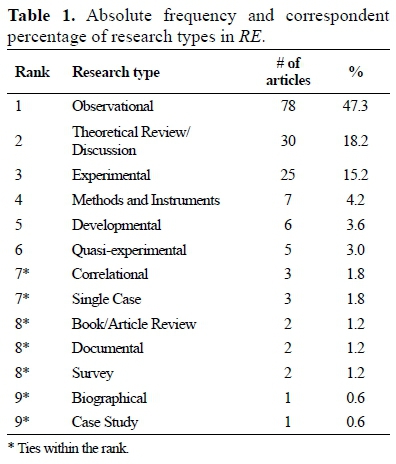
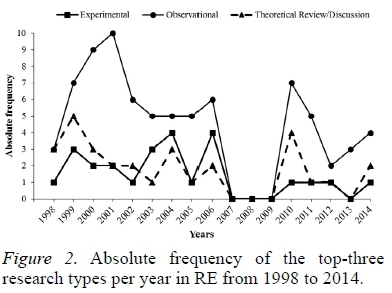
Approximately 130 different species were studied in the RE articles. Table 2 presents the number of publications per taxonomic classes referred to the found species. Information about studied species was available in 141 articles. Class "Mammalia" comprised more than half (56%) of the publications with species information. Classes "Insecta", "Aves" and "Arachnida" follows the rank. Tables 3-6 depict detailed information about orders and families of these four main classes. As a reflex of its prevalence as the most reported class in the studies, class "Mammalia" is represented by a higher number of orders and families.
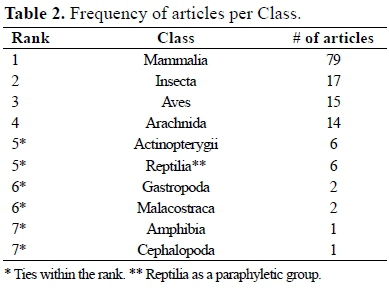
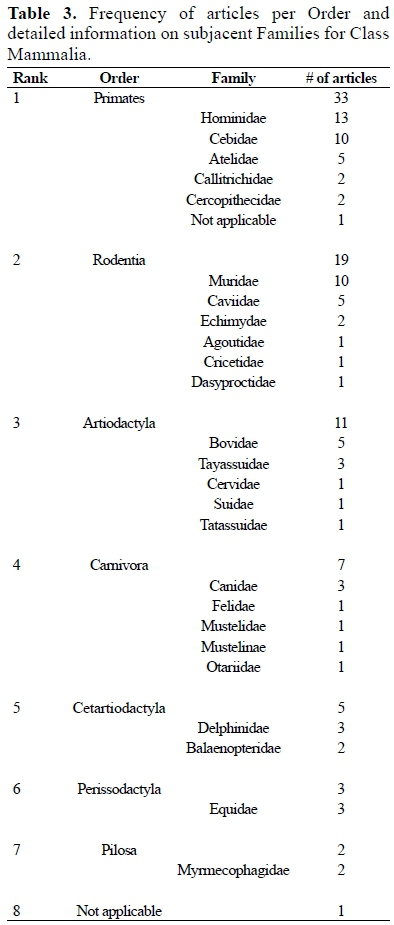
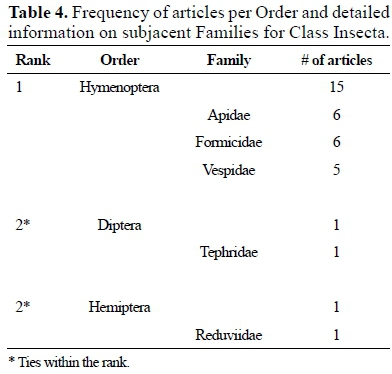
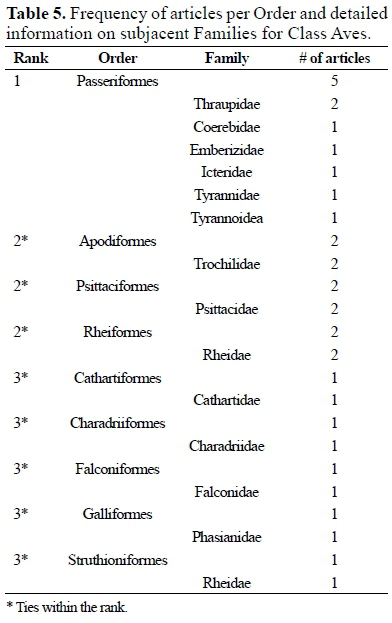
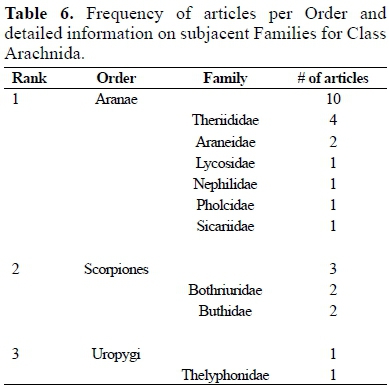
All regions of Brazil were reported as sites of empirical studies (i.e. with direct observation of species) in the RE articles, as can be seen in Table 7. The "Southeast" region was the most frequent choice for published research. Indeed, there is a consistency between the prevalent region for empirical research and the regions of the most prolific institutions. Table 8 presents the number of articles per institution. Twelve institutions are listed from the total number of 92 different institutions. The top three (Universidade de São Paulo, Universidade Estadual Paulista and Universidade Federal de Juiz de Fora) and three others (Instituto Butantan, Universidade Federal de Uberlândia e Universidade Federal do Espírito Santo) are located in Southeast Brazil (see Table 7). Additionally, Table 9 shows that although Brazil leads the rank with most publications, RE also published some articles from other countries, mostly from South America.
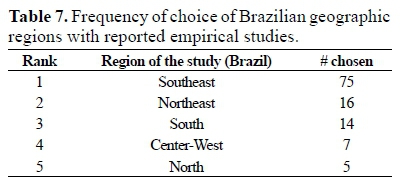
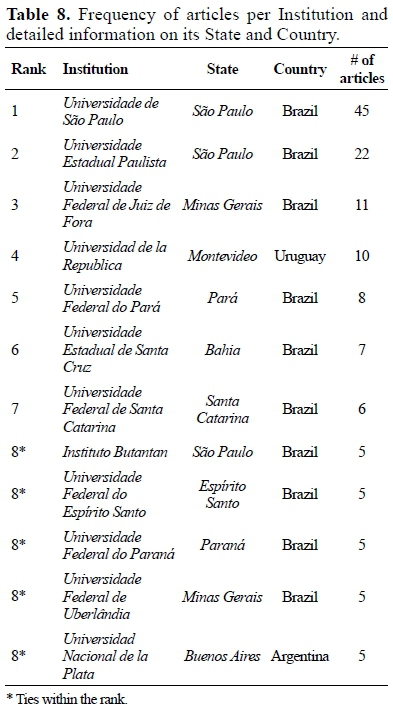
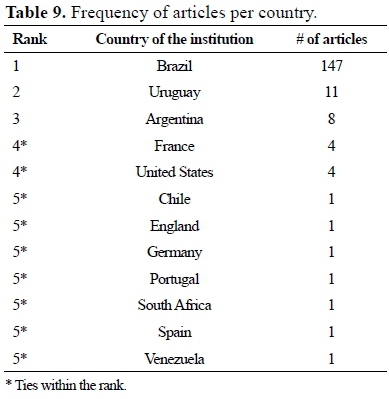
Discussion
The central objective of this study was to indicate publication trends in RE. In terms of publishing activity, the journal had an almost fair distribution of publications through the years. Apart from the three-year hiatus, the publishing years (1998-2006 and 2010-2014) were mostly healthy. However, fewer numbers were issued in recent years, which might have been partly due to the sudden death of César Ades in 2012, the founder editor of RE (Japyassú, 2012). The reduction in publications may have contributed to stimulating the efforts for the journal internationalization, thus enlarging the population of both authors and readers. RE is following a global trend (Flowerdew, 2015) in this aspect.
In terms of content, RE is a repository of assorted ethological and behavioral research. Empirical articles mostly employed the observational/descriptive method, a pivotal research strategy in Ethology, oriented to the generation of ethograms (Lahitte et al., 2002). Significant number of reports also used the experimental approach. The expressive application of either method in RE reports assures the journal commitment to the complementary aspect of these research types in Ethology (Dewsbury, 1992; Souto, 2005). Publications involving 11 additional research strategies strengthen the argument.
RE content also indicates flagrant prevalence of mammalian species. It is difficult to analyze this trend as representative or not of Brazilian animal diversity. Even though there are approximately 170.000 to 210.000 animal species described for Brazil (Lewinsohn and Prado, 2005), this number is below expectations, considering that the country has already been criticized for under cataloging its biodiversity (Geeta et al., 2004). Therefore, it is safer to just stress that reports in RE are mirroring an established trend in the history of ethology, that is, the study of mammalian species over others (Lahitte and Tujague, 2007).
The fact that Southeast Brazil is the frequent location for empirical studies and site of the most prolific institutions has a direct relation to the foundations of Ethology in the country. The Instituto de Psicologia at Universidade de São Paulo, which was the founder academic of SBEt and, consequently, of the RE, is located in Southeast Brazil. This university was and still is a leading institution for Brazilian Ethology (see Fuchs, 1995; Ades, 2010; Oliveira and Magrini, 2015). The importance of this region in the study of animal behavior can also be seen by the state-of-art of zoology research in Brazil (Marques and Lamas, 2006).
All other Brazilian regions and 11 different countries did publish in RE, an evidence of the pluralism of ideas that RE embraces. Even though some variability is expected, the relative shortage of studies coming from other regions rather than Southeast Brazil suggests that Ethology, as a field of research, still needs to develop in other parts of the country.
These trends give shape to some of the Brazilian ethological research, but they are only a loose indicative of general trends for Ethology in Brazil. Further analyses are needed to give it a thorough account. Studies of citation analysis, for example, is a suggested research alternative. Besides that, Brazilian articles have been published in international journals such as "Journal of Ethology" and "Acta Ethologica", not to mention the specialized periodicals. Analysis of these publications is also recommended.
Acknowledgements
We thank Jéssica Gama for assisting with data organization, Maraci Rubin for the careful review, and Olavo de Faria Galvão and Augusto Loureiro Henriques for their helpful suggestions. Masters scholarships were granted by CNPq to P. F. R. Soares and by FAPESPA/CAPES to A. C. S. Formento and F. I. B. Brandão.
Bibliography
ADES, C. Do bicho que vive de ar, em diante: Uma pequena história da etologia no Brasil. Boletim Academia Paulista de Psicologia 78 (1): 90-104, 2010. [ Links ]
CARVALHO, A. M. A. César Ades (08/01/1943-14/03/2012): Entre teias, bichos, crianças e gente grande, a paixão pela ciência. Memorandum 22: 226-241, 2012. [ Links ]
COZBY, P. C. and BATES, S. P. Methods in behavioral research. New York: McGraw-Hill Education, 2015. [ Links ]
DEWSBURY, D. A. Comparative psychology and ethology: A reassessment. American Psychologist 47 (2): 208-215, 1992. [ Links ]
FLOWERDEW, J. Some thoughts on English for Research Publication Purposes (ERPP) and related issues. Language Teaching 48 (2): 250-262, 2015. [ Links ]
FUCHS, H. Psicologia animal no Brasil: O fundador e a fundação. Psicologia USP 6 (1): 15-42, 1995. [ Links ]
GEETA, R., LEVY, A., HOCH, J. M. and MARK, M. Taxonomists and the CBD. Science 305 (5687): 1105-1106, 2004. [ Links ]
JAPYASSÚ, H. F. Alive memories. Revista de Etologia 11 (1): 1-2, 2012. [ Links ]
LAHITTE, H. B. and TUJAGUE, M. P. El conocimiento etológico como fantasma de la biología y su importancia para los estudios comparados. Antípoda: Revista de Antropología y Arqueología (5): 317-332, 2007. [ Links ]
LAHITTE, H. B., FERRARI, H. R. and LÁZARO, L. Sobre el etograma, 1: Del etograma como lenguaje al lenguaje de los etogramas. Revista de Etologia 4 (2): 129-141, 2002. [ Links ]
LEWINSOHN, T. M. and PRADO, P. I. How many species are there in Brazil? Conservation Biology 19 (3): 619-624, 2005. [ Links ]
MARQUES, A. C. and LAMAS, C. J. E. Taxonomia zoológica no Brasil: Estado da arte, expectativas e sugestões de ações futuras. Papéis Avulsos de Zoologia 46 (13): 139-174, 2006. [ Links ]
SOUTO, A. Etologia: Princípios e reflexões. Recife: Editora Universitária da UFPE, 2005. [ Links ]
SPINELLI DE OLIVEIRA, E. and MAGRINI, L. Ethology in Brazil (I): Doctoral Dissertations from 2010 to 2014. [Etologia no Brasil (I): Teses de Doutorado de 2010 a 2014]. Revista de Etologia 14 (1): 1-57, 2015. [ Links ]
OTTA, E. César Ades (08/01/1943-14/03/2012). Boletim de Psicologia 62 (136): 107-112, 2012. [ Links ]
This work is based on a term paper submitted by all authors except Alda L. Henriques as a requirement for the approval in the course "Fundamentos de Etologia" (Fundamentals of Ethology), offered by Programa de Pós-Graduação em Neurociências e Comportamento (Neuroscience and Behavior Graduate Program) at Universidade Federal do Pará. The spreadsheets with tabulated data can be obtained by contacting the corresponding authors.
* Correspondent author: E-mail aldalhenriques@gmail.com














